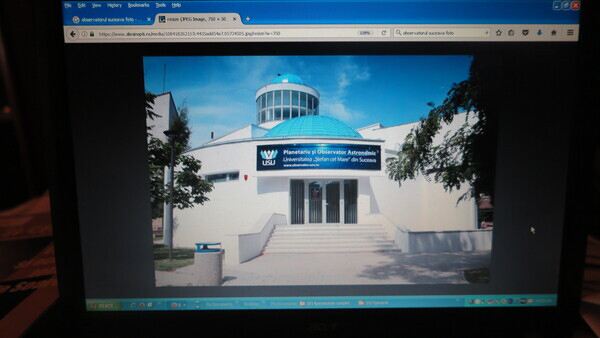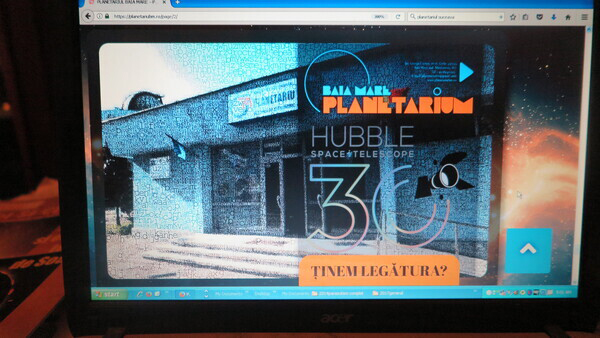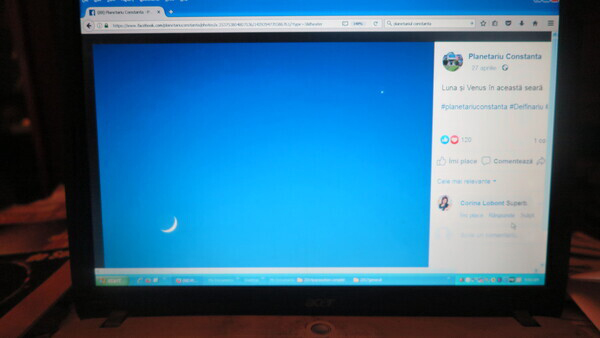For Global Astronomy Month 2020 (115): Echo (9) - GAM Time Tunnel (8)
By Andrei Dorian Gheorghe (text) and Florin Alexandru Stancu (design)
- Published: Thursday, June 04 2020 00:18
“A planetarium
is always a centre of
astronomical infection.”
-Dimitrie Olenici (senior astronomer at Suceava’s Planetarium and Observatory)-
My GAM time tunnel called me also to a tour of the old Romanian optical (conventional) planetariums (accompanied by small observatories) - where a few very good collaborators of the Romanian Society for Meteors and Astronomy-SARM develop their activities -, which were closed during the pandemic restrictions, and at first I “visited” three of them.
(I have to complete that the first digital planetarium in Romania was installed in 2008 in the town of Pitesti by the national expert in this field, Remus Petre Cirstea).
Suceava’s astronomical complex hosted the International Olympiad on Astronomy & Astrophysics in 2014.
But in 2020, unfortunately, Suceava (in North / North-East Romania, Bucovina province - former nucleus of the Romanian state of “Great” Moldova (which is today divided between Romania, Republic of Moldova and Ukraine) and later a great dukedom in the imperial times) was the most affected town by the pandemic in Romania.
And because it was quarantined for a few weeks, the local observatory and planetarium (a complex founded in 1982) could not organize the 15th edition of the national contest-exhibition-festival of astronomy, astroart, astro-essay and astropoetry for children (“Equinox”) and the 1st edition of the International Olympiad on Astronomy & Astrophysics for Juniors - which was postponed.
(“Astronomy is not just about learning the stars.
Astronomy means combining them with mathematics and physics,
and we have the lab above our head.”
-Petru Craciun, Falticeni, Suceava County, chief-coordinator of the Romanian teams for international astronomy olympiads-
Here I have to mention that in the last 10 years, although without astronomy included in the school curriculum, Romania won tens of medals at the International Olympiad on Astronomy & Astrophysics - giving a double absolute winner in two consecutive editions, Denis Turcu, and culminating with the first place in the contest of the national teams in 2011 - and the International Astronomy Olympiad, thanks to the support of an admirable group of volunteer teachers who train the students, but all the medalists were “absorbed” by western universities!
“The Theory of Relativity!
Enigma for students at Graduation exam,
Dilemma between physicists of Humanity,
Barrier of the speed limit,
Dogma of the mass flow
in energy,
Conflict between the theory of science and faith
in the field of neutrinos,
particles beams escaped going beyond
the speed of light
or summarized in the "God particle"!”
-Alfredo Caronia-
I’d also like to tell that in 2019, almost like in an act of symbolism, Romania organized an edition of the International Astronomy Olympiad - IAO, the older sister of IOAA - in Piatra Neamt (East Romania, not far from Suceava), a town which was put on the sky map of by the Italian amateur astronomer Alfredo Caronia, who discovered (with Luciano Tesi) an asteroid in Italy in 1998 and named it after this Romanian town, where he lives today!)
But Baia Mare’s planetarium and observatory (founded in 1968 and led by Ovidiu Ignat and Ioan Bob in North Romania, Maramures province - the “Land of Free Geto-Dacians”) published a few articles on their web site (including an on-line celebration of the Hubble Telescope) during GAM 2020.
At the same time, Constanta’s planetarium and observatory (founded in 1968, too, and led by Constanta Diamandi - after the “golden age” of Mihai Enescu and Nicolae Suciu) presented some news on the Facebook platform and concentrated on the conjunction between Venus and the Moon on April 26th.
(Constanta - former Tomis Constantiana in the Roman times - is the unofficial Capital City of the Dobrogea province in South-East Romania - which had a tumultuous Thracian-Dacian-Greek-Roman-Byzantine-Romanian-Slavic-Ottoman history -, where even Dionysius Exiguus, the founder of the Christian Chronology (Anno Domini dating) was born around the year 470 and received his youth education. Today, three groups of amateurs follow the astronomical tradition of this region: Astronomer Experience Astroclub - affiliated with SARM - in Constanta, Orion Scientific Society in Tulcea and AstroNauticus in Mangalia).
It is always good to see together
A planetarium and an observatory.
This is as if humankind would look for
Inner and outer glory.
-Andrei Dorian Gheorghe-










Comments